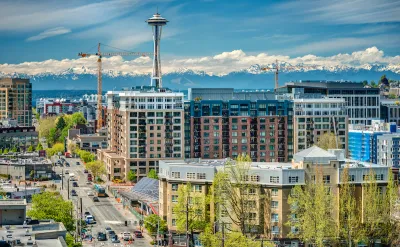An update to the city’s comprehensive plan will reduce, but not fully eliminate, parking mandates for housing developments.

Seattle intends to maintain minimum parking requirements in much of the city, even as it has reduced other restrictions on new housing construction, reports Ryan Packer in The Urbanist.
“The fact that the City of Seattle intends to keep parking mandates that could impede housing growth was a footnote as the City released new zoning maps last month, as part of the latest update to Bruce Harrell’s One Seattle Comprehensive Plan.” Yet the city has led the way on parking reform in the past, eliminating parking mandates near transit in 2012.
The updated rules would lower requirements to one stall per every two housing units. “This would apply to the city’s new middle housing regulations, which are set to allow four to six units on all lots across the city, but also to the 30 new “neighborhood centers” proposed, which include places like Tangletown, North Magnolia, and central Beacon Hill, where more units would be allowed.”
According to Matt Hutchins, founding principal at CAST Architecture, “The difference between having zero parking spaces and having one parking space might be that there’s 1,000 square feet of extra paved area.” Hutchins told The Urbanist, “It has an outsized effect. And many, many places have demonstrated that that [sic] not requiring parking doesn’t mean that developers won’t provide it when they can or want to.”
FULL STORY: Seattle Set to Double Down on Arbitrary Parking Mandates

National Parks Layoffs Will Cause Communities to Lose Billions
Thousands of essential park workers were laid off this week, just before the busy spring break season.

Retro-silient?: America’s First “Eco-burb,” The Woodlands Turns 50
A master-planned community north of Houston offers lessons on green infrastructure and resilient design, but falls short of its founder’s lofty affordability and walkability goals.

Delivering for America Plan Will Downgrade Mail Service in at Least 49.5 Percent of Zip Codes
Republican and Democrat lawmakers criticize the plan for its disproportionate negative impact on rural communities.

Test News Post 1
This is a summary

Test News Headline 46
Test for the image on the front page.

Balancing Bombs and Butterflies: How the National Guard Protects a Rare Species
The National Guard at Fort Indiantown Gap uses GIS technology and land management strategies to balance military training with conservation efforts, ensuring the survival of the rare eastern regal fritillary butterfly.
Urban Design for Planners 1: Software Tools
This six-course series explores essential urban design concepts using open source software and equips planners with the tools they need to participate fully in the urban design process.
Planning for Universal Design
Learn the tools for implementing Universal Design in planning regulations.
EMC Planning Group, Inc.
Planetizen
Planetizen
Mpact (formerly Rail~Volution)
Great Falls Development Authority, Inc.
HUDs Office of Policy Development and Research
NYU Wagner Graduate School of Public Service





























